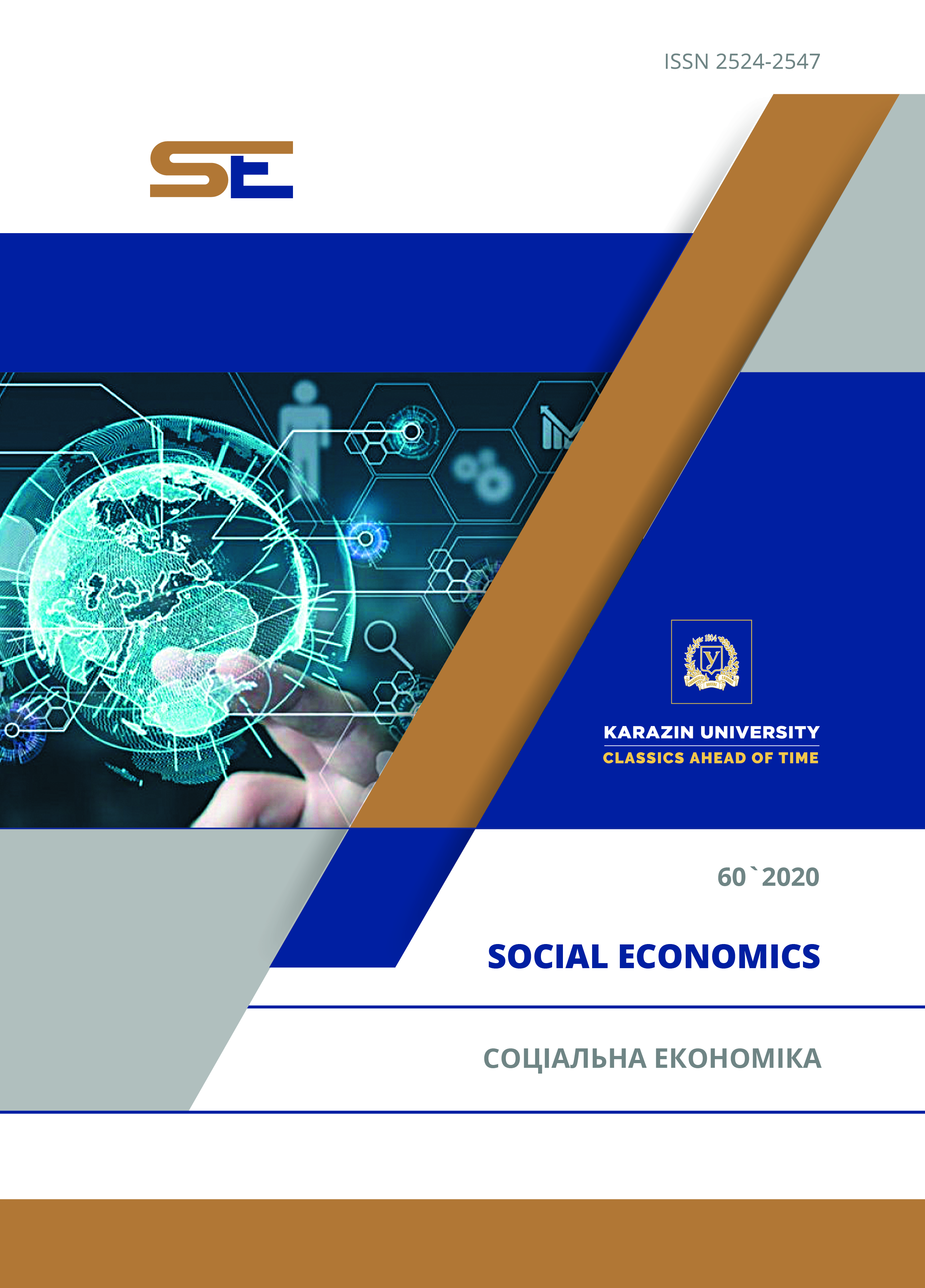MOTIVATION OF SCIENTIFIC AND PEDAGOGICAL EMPLOYEES OF HIGHER EDUCATIONAL INSTITUTIONS AS A FUNCTION OF PERSONNEL MANAGEMENT
Abstract
In modern society, education is the key to the development not only of a person as a person, but also of the whole country. Education determines the future of society, that is, it forms a new mindset of citizens and acts as one of the means of managing the development of society. Stimulation of scientific and pedagogical workers of higher educational institutions is the main element that will allow to fully unleash their potential, thereby moving to a new higher level of educational services. The article considers and analyzes the essence of the incentive system and motivation of scientific and pedagogical staff. Modern forms and methods of material and intangible motivation of labor of workers in the sphere of higher education of Ukraine have been investigated, because motivation directly affects the level of efficiency of employees, which will make it possible to achieve significant changes in the education system. Three groups of factors of the material system of labor motivation with the distribution of wages in accordance with the established systems of remuneration, social benefits and income from activities are identified. It is proposed to divide intangible motivation into social and altruistic motives depending on the obtained social status and usefulness of work. The shortcomings in both material and intangible motivation of scientific and pedagogical staff are outlined. The level of salaries of scientific and pedagogical workers in Ukraine and developing countries was analyzed, respectively; a SWOT analysis was made on the basis of this. The relationship between the stimulation of scientific and pedagogical personnel and the system of allowances and surcharges, as well as effective indicators of the activities of higher educational institutions, is disclosed. On the basis of the study, the basic principles of managing the incentive system for scientific and pedagogical workers were identified. Problems in motivation of domestic personnel compared to foreign ones have been identified. It is indicated the removal of the state and the government from stimulating pedagogical workers and proposed to use the direction of intangible motivation of employees by universities.
Downloads
References
Yarmosh, V. V. (2014). Approaches to classification of the modern methods of personell`s motivation. Ekonomichnyy analiz, 3, 263-268. (in Ukrainian)
Shostakovska, A. V., & Mukhina, H. V. (2019). Management of motivation of scientific-pedagogical workers in higher education units. State and regions. Series: Economics and Business, 1(106). Retrieved from http://www.econom.stateandregions.zp.ua/journal/2019/1_2019/19.pdf. (in Ukrainian)
Kontseva, V. V., & Ryzhankova, H. M. (2011). Motivation and stimulation in modern conditions. Project management, systems analysis and logistics, 8, 320-322. (in Ukrainian)
Sazonova, T. O., Kononenko, A. V., & Kononenko, I. V. (2018). Employees stimulation as an factor of increasing enterprise’s activity effectiveness. Economic Forum, 1, 214-221. (in Ukrainian)
Tsyhanok, D. I. (2015). Theoretical and methodical aspects of formation an effective system of material staff incentive in trade enterprises. Youth economic digest, 1(4), 20-26. (in Ukrainian)
Morenko, O. M. (2019). Peculiarities of readiness of teachers of higher education institutions to professional self-improvement. Scientific journal of M.P. Dragomanov National Pedagogical University. Series 5 Pedagogical Sciences: Realities and Perspectives, 68, 138-143. doi:10.31392/2311-5491/2019-68.30. (in Ukrainian)
Plishka, T. P. (2017). Salary of Teaching Staff: Ukrainian and World Experience. University research note, 61, 154-167. (in Ukrainian)
Howard, J. L., Chong, J.X.Y., & Bureau, J. S. (2020). The tripartite model of intrinsic motivation in education: A 30‒year retrospective and meta‒analysis. Journal of Personality, 88, 1268-1285. doi:10.1111/jopy.12570.
Obilo, O., & Alford, B. (2015). Advancing scholarship: Fostering the motivation to research in future marketing scholars. Journal for Advancement of Marketing Education, 23(1), 12-22.
Nguyen, Q. N., & Van Nguyen, L. (2019). Assessing the construct validity and reliability of the academic motivation scale in the Vietnamese context. Current Issues in Personality Psychology, 7(1), 64-79. doi:10.5114/cipp.2019.82752.
Vaculíková, J. (2019). An investigation of students ´ motivation to pursue higher education at a Czech university. Proceedings of the 33rd International Business Information Management Association Conference: Education Excellence and Innovation Management through Vision (pp. 1599-1609).
Can, G. (2015). Turkish version of the academic motivation scale. Psychological Reports, 116, 388-408. doi:10.2466/14.08.PR0.116k24w5.
Silva, P.C.C., Sicilia, Á., Burgueño, R., & Lirola, M. J. (2018). Academic motivation in the initial training of physical education teachers. Revista Internacional de Medicina y Ciencias de la Actividad Fisica y del Deporte, 18, 537-554. doi:10.15366/rimcafd2018.71.009.
Alivernini, F., & Lucidi, F. (2008). The academic motivation scale (AMS): Factorial structure, invariance, and validity in the Italian context. TPM ‒ Testing, Psychometrics, Methodology in Applied Psychology, 15, 211-220.
Office for Financial and Economic Analysis in the Verkhovna Rada of Ukraine. (2018). Foreign experience in calculating wages in major sectors of the economy (some countries of Western and Eastern Europe). Retrieved from https://feao.org.ua/wp-content/uploads/2018/08/18_07_31_economicsectors_v1.8.pdf. (in Ukrainian)
The level of teachers' salaries in different countries of the world. Retrieved from https://osvitoria.media/experience/skilky–zaroblyayut–vchyteli–v–riznyh–krayinah–svitu/. (in Ukrainian)
Verkhovna Rada of Ukraine. (2001). Law of Ukraine «Pro osvitu» September 5, 2017 No. 2145-VIII. Retrieved from https://zakon.rada.gov.ua/laws/show/2145-19#Text. (in Ukrainian)
Ministry of Education and Science of Ukraine. (2020). On the issue of increasing the level of remuneration of employees of educational and scientific institutions. Lyst MON August 26, 2020 No. 1/11-5735. Retrieved from http://osvita.ua/legislation/Ser_osv/76215/. (in Ukrainian)
Onyshchenko, V. (2020). Surcharges and allowances for teachers of higher education institutions. Retrieved from https://www.budgetnyk.com.ua/article/447–zarplata–vikladachv–vnz–2020. (in Ukrainian)
Morieva, O. (2020). Annual reward for teachers for conscientious work. Golovbuh:Bjudzhet, 37. Retrieved from https://ebudget.mcfr.ua/845196. (in Ukrainian)




